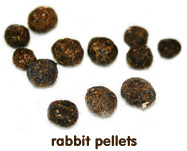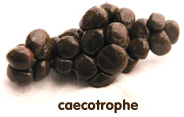Why keeping an eye on your rabbit's poo is important!
It's important to check your rabbit's droppings daily as they can be a great indication of the state of your bunny's health and whether an illness is present.

Rabbits do 2 different types of poos:
 Fecal Pellets
Fecal Pellets
Small, brown round, balls, almost odourless, with no liquid component
These are the usual type of rabbit poops we'd think of, or you would see when walking in fields; they are mainly made up of undigested hay or food. These poops should be plentiful, round like peas and of a uniform size and shape and size. They should be firm but not too hard if squeezed. If the fecal pellets are poorly formed, too small, too hard (like grit), or odd shapes, it's most likley your bunny is not getting enough fibre and needs to eat more hay and drink plenty of water, though it could be an indication of other possible health problems so ask a vet. If the poos are strung together like a necklace this can indicate your bunny is ingesting too much fur.
Cecotrophes (also called caecotrophes, cecals or 'night faeces')
Dark, mushy, smelly grape-like balls pressed together, thin film of mucus Did you know rabbits eat their own poo? It is mainly these smelly caecotrophes that they eat but occasionally they will eat a pellet or 2. Sometimes you will see your rabbit 'cleaning' themselves then they look up and they're munching on something - they have eaten a cecotrophe straight from their bum! This poo is made from the nutritious bits of food that have been sent to the caecum (appendix), fermented, then expelled as a nutritious snack. Also known as 'night faeces' as they often eat them at night (they like to do it in private). It's really important for rabbits to eat these caecotrophes so don't discourage them. In fact, if your rabbit is producing them but can't reach to eat them, don't throw them away - put them in front of him and he will eat them. This way he won't miss out on vital nutrients.
Did you know rabbits eat their own poo? It is mainly these smelly caecotrophes that they eat but occasionally they will eat a pellet or 2. Sometimes you will see your rabbit 'cleaning' themselves then they look up and they're munching on something - they have eaten a cecotrophe straight from their bum! This poo is made from the nutritious bits of food that have been sent to the caecum (appendix), fermented, then expelled as a nutritious snack. Also known as 'night faeces' as they often eat them at night (they like to do it in private). It's really important for rabbits to eat these caecotrophes so don't discourage them. In fact, if your rabbit is producing them but can't reach to eat them, don't throw them away - put them in front of him and he will eat them. This way he won't miss out on vital nutrients.
If you see a lot of cecotrophes then your rabbit may have too rich a diet. More hay should help, and cut down on pellets. If their diet is not properly balanced then the cecotrophes will have a consistency similar to toothpaste rather than the ideal (pic above) form of bunched, squishy pellets. Poorly formed cecals may also be missing nutrients.
Why does my rabbit have a dirty bottom? Why am I finding lots of cecotrophes?
The most common cause is an unbalanced diet (read below how to change it) but it can be for a number of reasons so keep an eye on your bunny and ask a rabbit-savvy vet for advice if it keeps happening. In the case of very runny poo / diarrhea contact your vet straight away.
If you are finding a lot of 'night poos' aka cecotrophes, your rabbit may not have been able to reach round to eat them. If they're still quite fresh don't throw them away - put them in front of him and he will eat them, and their important nutritional content. See your vet for reasons why your rabbit is unable to reach underneath to eat them (could be mobility issues such as arthritis etc).
How to create a balanced diet for your rabbit
Over-feeding pellets or mix will cause a runny bum. Each day your rabbits should be having:
- 90% hay (a pile the size of the rabbit, per rabbit, per day) Read why hay is vital for rabbits
- a small handful / eggcup full of pellets (the type that all looks the same, not muesli-style mix)
- a mixture of greens, veggies, fruits (1 cup of vegetables for each 4 lbs of body weight, up to 2 tablespoons of fruit per day)
Vegetables should only be given to buns over the age of 6 months, and introduced slowly over 3 - 4 days. Only give a small amount and wait for 24 hours. If there are any signs of runny poo, dirty bums, or noisy tummies (gurgling etc) then withdraw the food and try with something else after everything has settled back to normal. Allow 5 - 7 days before making any other additions. Avoid sweet foods like carrots, as they are too high in natural sugar which can cause upset tums.
Check out our diet pages for more info, such as What do rabbits eat?
A few possible reasons for a rabbit's sticky bum:
- Trying out new foods (greens, veg, etc) - give your rabbit a break from new foods and just give them hay and water, then slowly introduce small amounts of the food again to see if they can tolerate it
- Too rich a diet / too many pellets - increase hay, decrease pellets
- Not enough fibre - A rabbit should be fed unlimited grass hay, such as timothy, brome, wheat or oat. This will help them form healthy droppings
- Illness - ask your vet, especially if your rabbit has diarrhea as this can kill them very quick
- Obesity - overweight rabbits can't reach underneath themselves to eat the cecotrophes which they need to stay healthy
- Long-haired rabbits - may find it difficult to keep themselves clean if cecotrophes get caught in the fur
- Dirty living quarters - rabbits are very clean animals and don't tend to choose to sit in their faeces. If your rabbit is, he may feel unwell, or maybe there are no clean areas to sit in which case you'll need to clean them out more often! (2-3 times per week)
- Arthritis and other medical conditions - prevents them being able to reach around to eat their poops. If your rabbit is producing them but can't reach to eat them, don't throw them away - put them in front of him and he will eat them. This way he won't miss out on vital nutrition.
Dangers of poo stuck to your rabbit's bottom
As well as being smelly and uncomfortable, poo on your rabbit's bottom will attract flies - especially in the hot summer months - which can quickly lead to flystrike (read more about flystrike on our page What is flystrike?) This is when flies lay their eggs on the rabbit's bottom, the eggs hatch within hours and the maggots chew their way into the rabbit's skin. This can quickly become fatal, so you must contact a vet straight away if you suspect this.
How should I clean my bunny's bum?
If your rabbit has flystrike then a vet must clean them, not yourself. For just a bit of poo that needs cleaning off, if possible ask someone to hold your rabbit, supporting their belly and bottom, facing upwards so you can see the area that needs cleaning. Wipe off any excess with tissue and try cleaning the rest off with a damp cloth (or baby wipe). Rabbits should never be immersed in water as their fur doesn't dry out very well once soaked to the skin, and they can get pneumonia.
For more information on cleaning your rabbit's bottom visit here.
